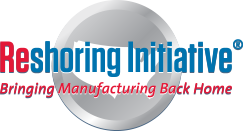Reshoring Domestic Supply Chains Using Compression Thinking
While the United States remains a global leader in the creation of new products much of the manufacturing innovation and capabilities have moved offshore. To restore these lost capabilities the country must adopt the strategies of the Reshoring Initiative® led by its founder Harry Moser. This initiative is designed to competitively bring manufacturing jobs back home to revitalize domestic supply chains. Companies are discovering that when they analyze the total cost of offshoring, it often makes more economic sense to keep supply chains local.
These actions will provide companies and their communities with a distinct competitive advantage. Together they can boost productivity and improve sustainable resilience in this fast-changing competitive world by adopting Compression Thinking introduced by Robert “Doc” Hall. Doc Hall was a Professor Emeritus, Kelley School of Business, Indiana University (USA). Having worked in engineering and manufacturing, in 1985 he became a founding member of the Association for Manufacturing Excellence (AME). In 1982, he wrote Zero Inventories, the first of many “lean” books and articles. In 1992, Doc wrote The Soul of the Enterprise, with critiques leading to an unending book, Compression. In the book, he contends that we need a major shift in business and economic practices to meet the challenges of the 21st century and proposes a general pathway – Compression Thinking. Compression Thinking builds on and integrates powerful models such as Lean, organizational learning, and sustainability. To implement the sort of changes that allow civilization to prevail rather than merely endure requires resourcefulness and ingenuity beyond any the world has ever employed. Doc Hall shows us how to learn more effectively both as individuals and organizations, and in terms of processes. He invites us to rethink our perpetual devotion to old ideals and welcome the shift in thinking that must be our first and immediate step. To that end, he became the chairman of the Compression Institute. The Compression Institute has a simple mission: Globally improve quality of life for everyone on earth, but drastically reduce our consumption of natural resources. Compression is all about “doing more with a lot less of everything" as reflected in these compression guidelines: Finite Earth: Seen from its surface, earth may seem infinite, but it isn’t. For practical purposes, our small dot in the universe is fixed in size. Therefore, its capacity to yield material to us is limited. Its capacity to absorb waste dumped into it is limited. If the earth is to take care of us, we must take care of it. This attitude is vastly different from regarding nature as a storehouse of resources to exploit, a dump for our garbage, and as an enemy to be conquered. Symbiotic Thinking: Systems thinking is far from new. Systemic thinkers are always nosing into how things interrelate. Symbiotic thinking extends systems thinking to always include natural processes. We can never know this in detail, but curiosity makes a huge difference in your thinking. Symbiotic thinking questions magic bullet answers to complex problems. Organize for Learning (to be more effective): If we must live in balance with nature, learning to effectively do this is more important than being efficient, although incredible efficiency is sometimes necessary. Most work organizations promote continuous improvement and R&D, innovating to compete in a market. However, learning for effectiveness constantly questions the effects of our actions on nature and on all human stakeholders. Learning is emotional, not just intellectual. Many ecological initiatives now concentrate more on ecological justice than on ameliorating human pressures on the planet. Competing narratives (and ideologies) vie for our allegiance through a welter of media. Quality Over Quantity, always: Commercial quality is the composite of various attributes of a product or service: features, ease-of use, reliability, durability, and ease of disposition at the end of useful life — convenience, includes the quality of all life. We can have more convenience than the earth can stand. How can we re-use, re-purpose, restore, regenerate, recycle, and have a better balance with nature? Conclusion Compression Thinking seeks to live in balance with nature, in all ways great and small. By contrast, financial reasoning, from simple to convoluted, assumes that human systems can grow without limit. We cannot go back to a lost past. We can learn from it, but we must invent a new low-consumption future. The intent of Compression Thinking, like Lean, is to accelerate pragmatic learning about serious issues and topics to respond to the core challenges for sustainable global economic growth and eliminate disruptions in the domestic supply chain.Glenn Marshall, the Association for Manufacturing Excellence (AME) leads an initiative for a “Manufacturing and Educational Renaissance,” member of the Reshoring Initiative, Job Creators Network, and Industry Reimagined 2030. Contact and www.ame.org.
- - -

